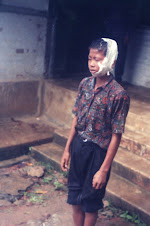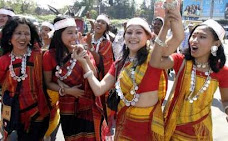Dated:-03/31/2008
MS. HENRIETTA H. FORE
Director of U.S. Foreign Assistance & USAID Administrator
U.S. Department of State
Room 5932
2201 C Street, N.W
Washington , D.C. 20520
Subject:Famine situation in CHTs region of Bangladesh
Dear Madam,
With due humble submission, we would like to put forward a few words to draw your kind attention on a famine like situation among indigenous populations living in remote areas of Chittagong Hill Tracts (CHTs) region of Bangladesh who are starving to death. They need food supply desperately to survive from this situation immediately.
This famine situation has arisen from extensive destruction of crops by acute surge of rat populations in those areas. These are underprivileged indigenous people who lead almost a nomadic life in a hand to mouth situation whole the year round. They reported to the government agencies earlier about a year ago when bamboo flower started to blossom. It was observed in the past that whenever bamboo flowers blossom in a certain year, usually in every 20-40 years, it is always followed by acute increase of rat populations who destroy all the crops and food. As the government agencies did not listen to their appeals on time because of their poor status, now these neglected and deprived people are suffering much from hunger associated with other diseases and conditions, even deaths. Only the wild leaves and roots have kept them alive in the recent months. Very recently, some organizations have started to operate relief operations in a limited scale what is quite inadequate in comparison to actual needs. Moreover, now they have become vulnerable to Bubonic Plague.
In these circumstances, we have an earnest appeal to you to kindly extend your helping hands to save these unfortunate and disastrous people from utmost sufferings from starving and other associated conditions. The USAID Country Representative might be aware of this situation.
It may be mentioned here that these indigenous populations are distinctly different from majority population of Bangladesh in respect of race, religion, culture, and life style. They live in remote areas of the region without electricity, safe water supply, sanitation, schools, and motor driven roads. Furthermore, these are the people who were displaced from their homestead due to decade long socio-political conflict in the region.
An Observation Report by Mr. Mark Dummett, BBC Correspondent, Bangladesh is attached herewith as an outstanding reference to actual situation.
Best regards.
Kirti Ranjan Chakma
President
Prasanjit Chakma
General Secretary
Copy to:
1.Ms. Geeta Pasi
Charge De’ Affaires, a.i
US Embassy, Dhaka, Bangladesh;
2.Dr. Stefan Frowein
Head of Delegation of the European Commission to Bangladesh
House 7, Road 84, Gulshan 2
Dhaka 1212, Bangladesh;
3.Ms. Renata Lok-Dessalien
UN Resident Coordinator to Bangladesh
C/O UNDP
G.P.O Box No. 224, Dhaka 1000, Bangladesh
4.Denise Rollins
Mission Director
USAID/Bangladesh
5.Mr. Doug Foskett
Australian High Commissioner to Bangladesh
184 Gulshan Avenue
Gulshan, Dhaka, Bangladesh
6.Ms. Victoria Tauli-Corpuz
Chief
Secretariat of the Permanent Forum on Indigenous Issues
United Nations, 2 UN Plaza
Room DC2-1772, New York, NY, 10017
7.Mr. Pinak Ranjan Chakravarty
High Commissioner of India
Dhaka, Bangladesh.. MR PINAK RANJAN CHAKRAVARTY, High Commissioner of India
skip to main |
skip to sidebar

Military enforcement

Survive

Torture

Raped & Killed Indigenous Jumma Women

Militarization in CHTs

Religious destruction

Land Grabbing

Indigenous Jumma Villeges burnt down

Atrocities


CHTs is a number one of Millitary Zone in the World.

With Traditional Dress
nandawansa

Military enforcement

Survive

Torture

Raped & Killed Indigenous Jumma Women

Militarization in CHTs

Religious destruction

Land Grabbing

Indigenous Jumma Villeges burnt down

Atrocities
Embassy in Los Angeles
About Bangladesh
Refugee in Homeland

News Papers
Audio & Video
Actrocities & Tortures

CHTs is a number one of Millitary Zone in the World.
Jumma Photo Albums
Jumma Links
Jumma Women

With Traditional Dress
Blog Archive
About Me
- IJPNUSA
- The Indigenous Jumma People Net in North America is for the movement of minority Jumma indigenous people in Chittagong Hill Tracts in Bangladesh. E-mail:jpnus@yahoo.com Webpage:-http://jummapeoplenet.blogspot.com/
